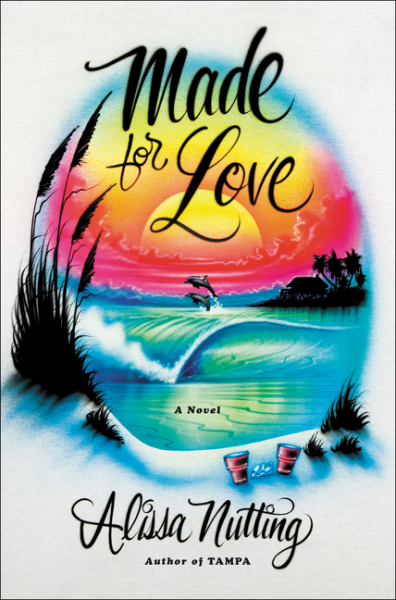
Farrar, Straus and Giroux, 2017
REVIEWED BY MATT E. LEWIS
__
Lindsay Hunter knows a thing or two about old wounds. The characters of her previous novel Ugly Girls, a Florida-based female coming-of-age story, are angry and complicated – dripping with all the cringing, emotional contradictions of puberty. Hunter once again uses the Floridian landscape as a pressure cooker for the characters of her new book, Eat Only When You’re Hungry, to vivid effect. But before we migrate down south, the story begins with Greg and his wife Deb, living in a strangely bucolic version of West Virginia. Despite the financial ruin and rampant drug addiction in most parts of the state, Greg is able to spend his retirement in a calmer neighborhood, most likely by his own design. We quickly learn that despite being obese and addicted to fast food, Greg has inherited his Mother’s snobbery toward the ‘unwashed masses’, much like the domineering mother of Bojack Horseman, whose venom and emotional trauma echoes down generations well past her own. Ironically, or maybe inevitably, Greg’s own son, GJ, is a junkie and perpetual loser, mooching off Greg’s ex-wife Marie in Florida. But when Greg gets the call from his ex which claims that GJ has disappeared, Greg rents an RV and takes off for the Sunshine State, in a hero’s journey that quickly dips into scathing self-examination, and finally a poignant dirge for the life he could have lived.
Of course, things don’t go as planned for Greg. Things deteriorate from the very start, when he leaves the comfortable womb of routine and immediately delves into a limp-dicked episode at a truck stop strip club. This is just the beginning of a pattern we see Hunter creating for the character from the start. On the one hand, we sympathize with Greg, who is often at the mercy of his own food addiction, depression, and traumatic upbringing. But there are just as many passages detailing how Greg’s violent actions and choices have shaped GJ’s own trauma. As in life, there is no hero or villain, just a cycle of behaviors that we try to fight against but often lose. Hunter drives the point home with Greg’s own awareness of his destructive behavior. Rather than a one-dimensional character trapped in a pattern of denial, Greg knows exactly where the blame rests for the fate of both himself and his son. “The mercy in that child’s heart, Greg knew he’d never deserved it. Would never deserve it. But if GJ was still a child, there might be mercy still,” he ruminates on moments when GJ didn’t yet understand what was happening, and takes it as hope that there could be possibility for change. But the other interpretation is that the time for enacting any kind of change has passed, and Greg must live with the shitty environment he’s created for him and his loved ones.
In addition to this generationally-repeating trauma, we also see Hunter deftly capture one of the most prevalent moral dilemmas – the child as a junkie. Though encouraged by the abuse and emotional distance of his father, GJ is an embodiment of all the classic symptoms of addiction: thefts, broken promises, ducking in and out of the lives of his loved ones without warning. The most heartbreaking aspect of this is that Greg does not feel one-sided, black and white contempt for his boy – rather, he understands and relates to him all too well. His mistreatment and disdain of him comes from a place of his own self-hatred, which he transfers to GJ, despite being sympathetic to his situation. “Home was a refuge of silence, where there were no expectations and no pressures. So Greg could understand why it felt so good for GJ to lie to himself, lie to Greg and Marie, about his plans for the future, and then never find the wherewithal to follow through.” In a way, Greg and GJ are two of a kind, both regretting their lost opportunities in life despite ending up on vastly different planes of social status. They are bound together by the common thread of addiction, with Greg’s weight and diet carrying as much impact on his health as GJ’s drug habits. Both are prisoners, and both have lost.
Trying to think about how these characters can resolve their lives misses the point. What Hunter has done in Eat Only When You’re Hungry is write a lovingly detailed ode to contemporary tragedy, one that looks ugliness in the face and accepts it as a fact of life. Calling this novel a ‘tragedy’ would be a bit of a misnomer – there is redemption toward the end – but not the kind of deus ex machina, jump-the-shark resolution we’re all used to seeing. In Eat Only When You’re Hungry, people are capable of both bad and good; they fight their impulses and are controlled by them. The answer is not that we always have a choice, or that our impulses are beyond our control, but that we live in a world with both and it’s our job to make sense of it. That empathy should be practiced not just with the people we meet ‘fighting a hard battle’, but with ourselves, too. Forgetting to do so can cause grave consequences for the people you love and who try to love you. Like addiction, habits are not easily broken, but require constant practice, vigilance, and patience. Lindsay Hunter has given us her parable of Greg, who even in the midst of his life spiraling out of control, remembers the mantra that at one time, gave him hope.
![[PANK]](https://pankmagazine.com/wp-content/themes/pank/assets/images/pank-logo-large.png)

